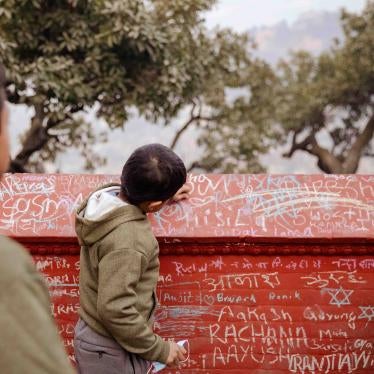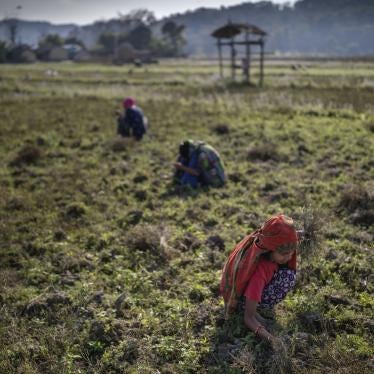To the Honorable Minister of Finance, Dr. Prakash Sharan Mahat
Ministry of Finance
Singh Durbar
Kathmandu, Nepal
Dear Dr. Mahat,
We are writing to you as a group of Nepali and international civil society organizations to urge that you use the forthcoming budget to protect the rights of Nepali children by expanding the government’s successful Child Grant program.
In the 1990s, Nepal became a pioneer of social protection policy in South Asia by introducing an old age allowance. Building on that legacy, Nepal has an opportunity to further develop world-leading social protection policies that protect human rights by reducing inequality, poverty including child-poverty, increase resilience to shocks, and invest in a more just economy. With 40 percent of the population under the age of 18, investing in social protection for children is more important than ever to protect their rights and for Nepal’s future prosperity.
The Nepali government first introduced the Child Grant in five Karnali districts in 2009. In light of the Grant’s positive impacts on children’s well-being, the government expanded it to three additional Karnali districts in 2017, with a commitment to expand it nationwide by 2025. However, it is currently only available to children in 25 out of 77 districts, and Dalit children under 5 nationally. Eligible families receive a monthly payment of NRs 532 for up to two children under the age of 5. This is the lowest level of all current social allowance payments. Nevertheless, studies by the United Nations and academics have found that the Child Grant has increased birth registration rates and enabled families to buy food, clothes, and afford other essential expenses to protect their children’s rights. It lowered the likelihood of child labor for the recipients and their siblings.
Research published in Archives of Public Health on the Karnali region, where the policy was first introduced, found that the Child Grant improved food security and health. It also enhanced the public's perception of the government. In a survey of 2,040 households, the Oversees Development Institute found that 93 percent of beneficiaries believed the government cared about their socioeconomic well-being, with 85 percent reporting an improved opinion of the government owing to the program.
A crucial feature of the Child Grant is that – when implemented in full – it is designed to be a universal program that all Nepali children are entitled to. When financial resources are limited, targeting social protection at the poorest households may appear to be an efficient strategy. However, targeting the poorest families has high administrative costs and often fails to reach eligible beneficiaries, because of the lack of up-to-date information or exclusionary means tests. They fail to protect every child’s right to social security and can contribute to a social divide between beneficiaries and non-beneficiaries.
Global financial contributions, such as from a proposed Global Fund for Social Protection, could help finance the gaps emerging in the nationwide expansion of social protection programs like the Child Grant. However, domestic financing is critical for a social protection system's long-term sustainability, and Nepal’s policy of meeting social protection expenditure from domestic revenues is correct. The government should take steps to mobilize domestic resources to progressively attain universal social protection by reforming the tax system or setting budgetary priorities that emphasize everyone’s right to social security.
According to a 2021 UNICEF study, expanding the Child Grant to all children up to the age of 17 by 2035 is feasible for Nepal’s government, costing less than 0.7 percent of GDP a year. The implications for people’s economic and social rights would be significant. Family poverty could drop by as much as 16.8 percent, enabling families to afford better nutrition, healthcare, and education.
The disadvantages of growing up in poverty can harm children for the rest of their lives, and that harm persists across generations, setting back the entire country’s development. In 2019, the government and the UN estimated that one in three children aged under 5 were stunted by malnutrition. In June 2020, UNICEF estimated that nearly 10 million children lived in poverty. However, in 2019-20, the government allocated only 4 percent of the social protection budget to children. In 2022, the Child Grant covered only about 40 percent of children aged under 5, and just 9.5 percent of all Nepali children.
Social security is a human right enshrined in the Universal Declaration of Human Rights and the International Covenant on Economic, Social, and Cultural Rights. The right to social security is also recognized in the Nepali Constitution (Article 43). Countries should guarantee protection to everyone, particularly in the event of unemployment, parenting and other caregiving responsibilities, accident, illness, disability, old age, or other life circumstances.
The Child Grant is an already-proven government social protection program that can have a deep impact protecting children’s rights. In your forthcoming budget, we urge you to expand the policy as a step towards universal coverage of all children in Nepal. Millions of children and their families would benefit, and so would the entire country.
Yours Sincerely,
- Human Rights Watch
- Social Protection Civil Society Network (SPCSN)
- INSP!R Nepal
- HomeNet Nepal
- We Social Movements (WSM)
- Jagriti Child and Youth Concern Nepal (JCYCN)
- National Initiatives for Child Survival Nepal
- Kapilvastu Integrated Development Services (KIDS)
- National Campaign for Sustainable Development Nepal (NACASUD-Nepal)
- South Asia Alliance for Poverty Eradication (SAAPE)
- Rural Reconstruction Nepal (RRN)
- GOPAL NEPALI
- Children & Women in Social Service & Human Rights (CWISH)
- Child Workers in Nepal (CWIN)
- Oxfam
- Child Friendly Local Governance (N-CFLG)








